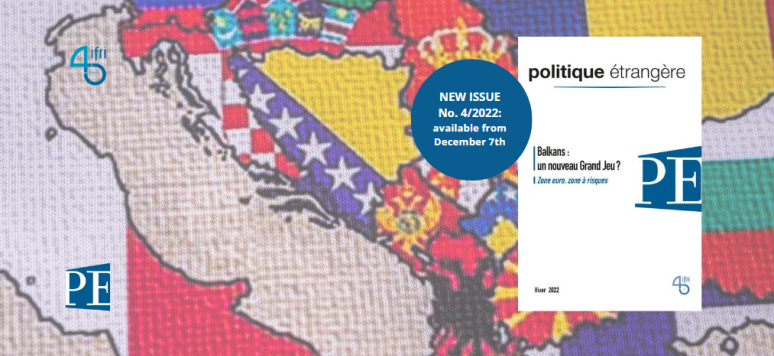Sommaires de Politique étrangère - The Balkans: A New Great Game? Politique étrangère, Vol. 87, No. 4, Winter 2022

What political spaces make up the Old Continent? This question is at the heart of the Ukrainian conflict.
The western Balkans symbolize the difficulty of conceptualizing the relationships between these shifting political spaces. Are all of the Balkan states destined to join the European Union (EU)? On what timescale and under what conditions? Can accession negotiations ignore the internal instability in some of these states? What of the problems of regional coexistence?
Moreover, while power relationships are being redrawn in Europe, the Balkans remain a contested space for multiple actors: for the EU; for the indirect maneuvers of Russia; and for China, looking to increase its gateways into Europe.
This edition of Politique étrangère seeks to describe the multiple current strategic issues in the Balkans, for countries in the region uncertain of their future, but also for the EU, which needs to redefine the philosophy, pace, and procedures of enlargement, thus far poorly thought-out from a political perspective.
These questions seem all the more pressing with the double shock of the Covid-19 crisis and the war in Ukraine directly threatening the economic stability of the EU and the eurozone. Witness the accumulation of national debt, the repercussions of sanctions against Russia, and the requirements of the energy transition: beyond the direct consequences of the war, the immediate future of the EU is in question, and thus its place in the overall restructuring of the continent.
This issue is available in French only.
THE BALKANS: A NEW GREAT GAME?
European Union-Western Balkans: Lost Illusions? [1], by Pierre Mirel (In French only - Union européenne-Balkans occidentaux : les illusions perdues ? [2])
China in the Western Balkans, by Ana Krstinovska
Serbia: Walking the Tightrope between Russia and the West, by Florian Bieber
The Slow Shipwreck of Bosnia and Herzegovina, by Aline Cateux
Kosovo, a Hindered State, by Florent Marciacq and Donika Emini
THE EUROZONE IN PERIL
The Eurozone’s Vulnerabilities and Risks [3], by Norbert Gaillard (In French only - Vulnérabilités et risques de la zone euro [4])
The Euro, Thirty Years after Maastricht and Ten Years after the Greek Drama, by Jean-Marc Daniel
CURRENT AFFAIRS
The Enlargement of the EU and the Transformation of the Continent, by Sébastien Maillard
Chile: A Line that Cannot be Drawn, by Axel Nogué
Sri Lanka: From Economic Collapse to Revolt, by Lola Guyot
BAROMETERS
China in Central and Eastern Europe: The End of the Mirage?, by Olga V. Alexeeva and Frédéric Lasserre
OPINION
The Roots of a Quarter-Century of Violence Lie to the East of Congo (Kinshasa), by Colette Braeckman
BOOK REVIEWS
Edited by Marc Hecker
Economics for a Fragile Planet: Rethinking Markets, Institutions and Governance, by Edward Barbier
Unsustainable World: Are We Losing the Battle to Save Our Planet?, by Peter N. Nemetz
GIEC, la voix du climat, by Kari De Pryck
This review essay is written by Hugo Le Picard
